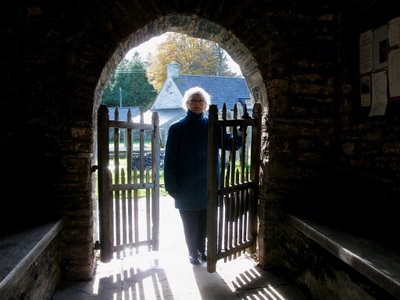The guidebook to the church tells an interesting story as to how Clydawg became a martyr.
'Our crowned Prince Clydawg, now King or Ruler of Ewias, was out hunting one day (according to the Book of Llandaff) and amongst those hunting with him was one who was jealous of his relationship with a lady friend.
In his jealousy he killed Clydawg.
On the day of his burial the two oxen carrying him refused to cross a ford and the yoke between them broke.
He was buried, therefore, near the bank of the river.
Such an act of murder made Clydawg, because of his godly life, a martyr'.
A Celtic 'Llan' or church was set up around his tomb and later a wooden church would have been built on the site, to be replaced with a stone church sometime in the 11th century.







